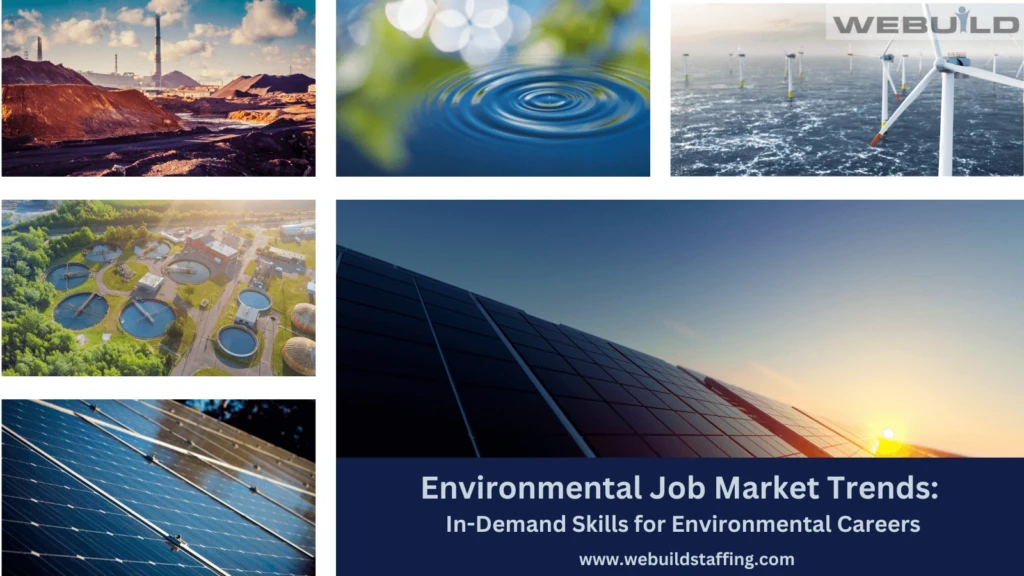The environmental jobs market is experiencing significant growth as organizations and governments worldwide increasingly prioritize sustainability and environmental responsibility. As the world grapples with climate change and environmental challenges, green careers are on the rise. In this blog post, we will delve into the latest environmental jobs market trends and explore the in-demand skills that can help you thrive in the world of eco-friendly professions. Whether you are an aspiring environmental professional or looking to pivot your career towards sustainability, understanding these trends is crucial for success.
Growth in Renewable Energy
One of the most prominent trends in the environmental job market is the rapid growth of the renewable energy sector. As countries aim to transition to clean energy sources, there is a high demand for professionals with expertise in solar, wind, hydro, and geothermal energy. Job opportunities in this field range from research and development to project management, installation, and maintenance of renewable energy systems.
In-Demand Skills:
- Solar Panel Installation: Proficiency in installing and maintaining solar panels is a sought-after skill as solar energy adoption continues to expand.
- Wind Turbine Maintenance: Skilled technicians who can maintain and repair wind turbines are in high demand.
- Grid Integration: Understanding how to integrate renewable energy sources into existing power grids is crucial for energy professionals.
Sustainability Consulting
Businesses and organizations are increasingly seeking sustainability consultants to help them reduce their environmental footprint and improve their corporate social responsibility. Sustainability consultants assess a company’s operations, identify opportunities for efficiency and sustainability improvements, and provide guidance on sustainable practices.
In-Demand Skills:
- Environmental Assessment: Conducting comprehensive environmental assessments and impact analyses.
- Sustainable Supply Chain Management: Expertise in optimizing supply chains for sustainability and reduced waste.
- Green Building Certification: Familiarity with green building standards like LEED (Leadership in Energy and Environmental Design).
Environmental Policy and Advocacy
The push for stronger environmental policies at both national and international levels has created a growing need for professionals in environmental policy and advocacy. Organizations, NGOs, and government agencies require experts to research, draft, and advocate for environmentally friendly policies and regulations.
In-Demand Skills:
- Policy Analysis: Analyzing the potential impact of policies on the environment and society.
- Government Relations: Building relationships with government officials and stakeholders to influence policy decisions.
- Environmental Law: Legal expertise in environmental regulations and compliance.
Environmental Data Analytics
The collection and analysis of environmental data play a crucial role in decision-making and problem-solving. Environmental data analysts use technology and data-driven insights to address environmental challenges, from climate modeling to pollution control.
In-Demand Skills:
- Data Analysis Tools: Proficiency in data analysis software and programming languages like Python and R.
- Remote Sensing and GIS: Knowledge of remote sensing technologies and Geographic Information Systems (GIS) for environmental mapping and analysis.
- Environmental Modeling: Ability to create predictive models for climate, ecosystems, and pollution.
Circular Economy and Waste Management
Efforts to reduce waste and promote a circular economy have led to increased demand for professionals who can manage waste effectively and implement sustainable waste reduction strategies.
In-Demand Skills:
- Waste Reduction Strategies: Expertise in designing and implementing waste reduction programs for organizations.
- Recycling Technologies: Understanding of advanced recycling technologies and processes.
- Sustainable Packaging: Knowledge of sustainable packaging materials and practices.
Water Resource Management
The management of water resources is a critical environmental concern, particularly in the face of climate change and growing populations. Professionals in this field focus on water conservation, quality management, and sustainable water use.
In-Demand Skills:
- Water Quality Monitoring: Expertise in monitoring and improving water quality in natural ecosystems and water treatment facilities.
- Water Policy: Knowledge of water laws, regulations, and policies at local, national, and international levels.
- Drought Management: Skills in managing water resources during drought conditions.
Eco-Friendly Agriculture
Sustainable agriculture practices are gaining momentum as the world seeks to address food security and minimize environmental impacts. Careers in eco-friendly agriculture involve implementing practices that reduce chemical use, conserve soil and water, and promote biodiversity.
In-Demand Skills:
- Organic Farming: Knowledge of organic farming practices and certification requirements.
- Agroecology: Understanding of ecological principles in agriculture and sustainable farming systems.
- Precision Agriculture: Proficiency in using technology to optimize farming practices.
Environmental Education and Communication
Raising awareness and educating the public about environmental issues are critical components of the sustainability movement. Environmental educators and communicators are in demand to engage communities, schools, and organizations in eco-friendly practices.
In-Demand Skills:
- Effective Communication: Strong written and verbal communication skills to convey complex environmental concepts to diverse audiences.
- Community Engagement: Experience in organizing community events, workshops, and educational programs.
- Digital Marketing: Knowledge of digital marketing tools to promote environmental causes online.
Green Building and Sustainable Architecture
The construction industry is shifting toward green building practices and sustainable architecture to reduce energy consumption and environmental impact. Professionals in this field design and construct eco-friendly buildings and infrastructure.
In-Demand Skills:
- LEED Certification: Familiarity with Leadership in Energy and Environmental Design (LEED) certification requirements.
- Energy-Efficient Design: Expertise in designing buildings with energy-efficient features.
- Materials Sustainability: Knowledge of sustainable building materials and construction practices.
Climate Change Mitigation and Adaptation
Climate change professionals work on strategies to mitigate greenhouse gas emissions and adapt to the impacts of a changing climate. This field includes roles in renewable energy, carbon capture, climate policy, and climate risk assessment.
In-Demand Skills:
- Climate Modeling: Ability to use climate models to predict future climate scenarios.
Webuild Staffing Agency is a leading executive search and staffing agency dedicated to the construction, engineering and environmental industries. To learn more please visit: www.webuildstaffing.com


